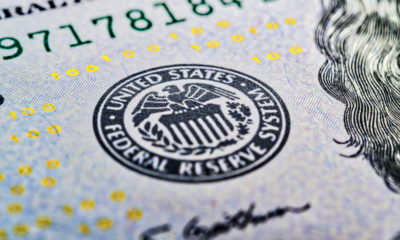Business
Why Mortgage Refinances Just Surged 21%

After the United Kingdom’s vote to exit the European Union on June 23, economists everywhere have been quick to denounce Brexit for its negative potential (and already existing) impact on the world economy.
A few prospective examples have included:
- Decreased hiring and recruitment in the UK
- Decreased value of both the pound and the Euro
- Lower real estate value in the U.K. due to falling demand
Among the other wide-ranging economic impacts of Brexit, it has had a positive influence on the U.S. economy.
Despite projected decreases in foreign direct investment from the U.K., the relative confidence in the stability of the U.S. economy has already begun to attract investment and job possibilities.
Especially in the real estate sector, Brexit has given the economy a big boost due to the relatively high demand for land in the United States.
After Brexit, mortgage rates for U.S. homes have decreased significantly.
In the week of July 1, the total number of applications for U.S. mortgages increased by 14%, as described by the Mortgage Bankers Association.
The total volume of applications is currently 66% higher than this same period in 2015.
Additionally, people have taken advantage of this real estate boom, and supported more prospective industry growth, by applying to refinance their home mortgages.
Mortgage refinancing can take the form of cash-out (applying for a new mortgage for more than you previously owed) or rate and term (saving money by using for a better rate on your current loan).
Refinancing applications, or rate and term refinancing, increased 21% last week.
This beats out the rate for the same time last year by a whopping 113.5 percent.
The lower interest rates for “jumbo loans” or cash-out loans have led to more people taking out significant loans to finance their homes, allowing them to make money overall thanks to the difference in interest rates.
[ms_divider style=”normal” align=”left” width=”100%” margin_top=”30″ margin_bottom=”30″ border_size=”5″ border_color=”#f2f2f2″ icon=”” class=”” id=””][/ms_divider]
[ms_featurebox style=”4″ title_font_size=”18″ title_color=”#2b2b2b” icon_circle=”no” icon_size=”46″ title=”Recommended Link” icon=”” alignment=”left” icon_animation_type=”” icon_color=”” icon_background_color=”” icon_border_color=”” icon_border_width=”0″ flip_icon=”none” spinning_icon=”no” icon_image=”” icon_image_width=”0″ icon_image_height=”” link_url=”https://offers.thecapitalist.com/p/warrenbuffet/index” link_target=”_blank” link_text=”Click Here To Find Out What It Said…” link_color=”#4885bf” content_color=”” content_box_background_color=”” class=”” id=””]Warren Buffett Just Told His Heirs What He Wants them To Do With His Fortune When He Dies. [/ms_featurebox]
[ms_divider style=”normal” align=”left” width=”100%” margin_top=”30″ margin_bottom=”30″ border_size=”5″ border_color=”#f2f2f2″ icon=”” class=”” id=””][/ms_divider]
Mike Fratantoni, the head economist in the MBA, states in an interview that although mortgage rates have been relatively low for years, Brexit has caused the prices to record low levels near.
Because of this, borrowers have significant incentives to take out more loans than usual.

The application rate for new loans to buy homes are typically less responsive to market changes than refinancing application rates, but nevertheless, the rate for these loans has jumped 4 percent, which is 23 percent higher than this week last year.
Fratantoni noted that even though there is still some fear of market volatility in the United States, the high employment prospects and low-interest rates have led to increased loan applications and higher home values.
The 30 year, fixed rate mortgage (with less than $417,000 loan balance) is now at an interest rate of 3.66 percent.
This is the lowest rate since May 2013.
This is a decline from the previous average rate of 3.75.
The interest rates for jumbo loans (those with over $417,000 loan balance) now average 3.67 percent.
This is the lowest rate since January 2011. The rate has fallen from its previous average of 3.74.

Mortgage News Daily wrote that some economists have even been quoting projected rates as low as 3.25 percent for fixed rate 30-year loans.
The ten-year Treasury, which is a good reflector of interest rates in general, has reached new lows; suggesting further interest rate decreases.
Matthew Graham of Mortgage Daily News has emphasized that even though some lenders have offered lower rates at some points during 2012, these new average rates can be seen as new all time lows.
Never before have the average rates declined to such lows together so consistently.
The occasional low rates of 2012 were available for a few days, every once in a while.
He notes that current trends point to consistently low rates over time; in this case, the country has never experienced such sustained low-interest rates.
A change in the current trajectory would require a major economic action by the Federal Reserve, which at this point is not likely, says Graham.
Unlike in 2013, when the Reserve cut back on the purchase of federal bonds backed by mortgages, there is no pressing reason for the Reserve to take action.
It is likely that the loan rates with stay low for the foreseeable future, a good sign for the real estate industry as home purchases keep increasing.
The more economic research economists are doing into Brexit; the less likely mortgage rate hikes are.
Meanwhile; the real estate market in the United Kingdom fears a crash, as an economic crisis caused by Brexit could cause interest rates to spike.
Although most mortgages in the U.K. are fixed for a few years, new mortgages and those who are currently up for refinancing are at risk of higher rates.
Especially if lenders foresee a hectic economic future, as Brexit is predicted to cause, they will err on the side of caution.
This will lead to higher refinancing and initial loan rates for borrowers and homeowners in the U.K.













